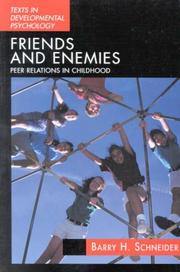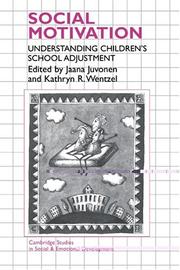| Listing 1 - 4 of 4 |
Sort by
|
Book
ISBN: 1282393014 9786612393013 0857001981 9780857001986 1849050481 9781849050487 9781849050487 Year: 2009 Publisher: London Philadelphia Jessica Kingsley Publishers
Abstract | Keywords | Export | Availability | Bookmark
 Loading...
Loading...Choose an application
- Reference Manager
- EndNote
- RefWorks (Direct export to RefWorks)
This programme contains detailed instructions and photocopiable handouts for teaching children about friendship. It combines group activities, individual work, homework exercises and games, and will be especially useful for groups containing children with developmental and social difficulties, such as ADHD or autism.

ISBN: 0340732091 Year: 2000 Publisher: London : Arnold,
Abstract | Keywords | Export | Availability | Bookmark
 Loading...
Loading...Choose an application
- Reference Manager
- EndNote
- RefWorks (Direct export to RefWorks)
Peer pressure in children --- Peer pressure in adolescence --- Interpersonal relations in adolescence --- Interpersonal relations in children --- Interpersonal relations in adolescence. --- Interpersonal relations in children. --- Peer pressure in adolescence. --- Peer pressure in children. --- Ontwikkelingspsychologie --- sociale en morele ontwikkeling --- sociale en morele ontwikkeling. --- Sociale en morele ontwikkeling. --- Amitié --- Comportement social --- Enfant --- Identité collective --- Interaction sociale --- Relation interpersonnelle

ISBN: 0813570514 0585172544 9780585172545 0813524598 0813524601 9780813524597 9780813524603 Year: 1998
Abstract | Keywords | Export | Availability | Bookmark
 Loading...
Loading...Choose an application
- Reference Manager
- EndNote
- RefWorks (Direct export to RefWorks)
Peer Powerseeks to explode existing myths about children's friendships, power and popularity, and the gender chasm between elementary school boys and girls. Based on eight years of intensive insider participant observation in their own children's community, Peter and Patti Adler discuss the vital components of the lives of preadolescents, popularity, friendships, cliques, social status, social isolation, loyalty, bullying, boy-girl relationships, and afterschool activities. They describe how friendships shift and change, how people are drawn into groups and excluded from them, how clique leaders maintain their power and popularity, and how individuals' social experiences and feelings about themselves differ from the top of the pecking order to the bottom. In so doing, the Adlers focus their attention on the peer culture of the children themselves and the way this culture extracts and modifies elements from adult culture. Children's peer culture, as it is nourished in those spaces where grown ups cannot penetrate, stands between individual children and the larger adult society. As such, it is a mediator and shaper, influencing the way children collectively interpret their surroundings and deal with the common problems they face. The Adlers explore some of the patterns that develop in this social space, noting both the differences in boys' and girls' gendered cultures and the overlap in many social dynamics, afterschool activities, role behaviour, romantic inclinations and social stratification. For example, children's participation in adult-organized afterschool activities - a now-prominent feature of many American children's social experience - has profound implications for their socialization and development, moving them away from the negotiated, spontaneous character of play into the formal systems of adult norms and values at ever-younger ages. When they retreat from adults, however, they still display distinctive peer group dynamics, forging strong ingroup/outgroup differentiation, loyalty and identification. Peer culture thus contains informal social mechanisms through which children create their social order, determine their place and identity, and develop positive and negative feelings about themselves. Studying children's peer culture is thus valuable as it reveals not only how this subculture parallels the adult world but also how it differs from it.
Children --- Cliques (Sociology) --- Interpersonal relations in children --- Peer pressure in children --- Social interaction in children --- Social networks --- Peer Pressure --- Social Interaction --- Interpersonal Relations --- Family & Relationships --- Psychology --- Social Science --- Peer pressure --- Social interaction --- Interpersonal relations --- Family & relationships --- Social science

ISBN: 0521473241 0521564425 0511571194 Year: 1996 Publisher: Cambridge : Cambridge University Press,
Abstract | Keywords | Export | Availability | Bookmark
 Loading...
Loading...Choose an application
- Reference Manager
- EndNote
- RefWorks (Direct export to RefWorks)
How are children's social lives at school related to their motivation to achieve and how do motivational and social processes interact to explain children's adjustment at school? This volume, first published in 1990, features work by leading researchers in educational and developmental psychology and provides perspectives on how and why children tend to thrive or fail at school. The individual chapters examine the unique roles of peers and teachers in communicating and reinforcing school-related attitudes, expectations, and definitions of self. Relations of children's school adjustment to school motivation, interpersonal functioning, and social skillfulness are also explored. The developmental and social perspectives on motivation and achievement presented in this volume provide new insights into the complex processes contributing to school success.
Achievement motivation in adolescence. --- Achievement motivation in children. --- Social desirability in adolescence --- Social desirability in children. --- Student adjustment. --- Motivation d'accomplissement chez l'adolescent --- Motivation d'accomplissement chez l'enfant --- Désirabilité sociale chez l'adolescent --- Désirabilité sociale chez l'enfant --- Adaptation scolaire --- Motivation in education. --- Peer pressure in adolescence. --- Peer pressure in children. --- Social desirability in adolescence. --- Désirabilité sociale chez l'adolescent --- Désirabilité sociale chez l'enfant --- Health Sciences --- Psychiatry & Psychology --- Academic motivation --- Academic achievement --- Learning, Psychology of --- Motivation (Psychology) --- Adolescent psychology --- Child psychology --- Social desirability --- Academic adjustment --- Adjustment (Students) --- School adjustment --- Adjustment (Psychology) --- Performance in children
| Listing 1 - 4 of 4 |
Sort by
|

 Search
Search Feedback
Feedback About UniCat
About UniCat  Help
Help News
News